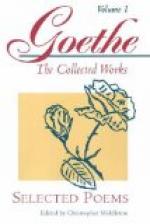1789.* ----- The instructors.
When Diogenes quietly sunn’d himself in his barrel,
When Calanus with joy leapt in the flame-breathing
grave,
Oh, what noble lessons were those for the rash son
of Philip,
Were not the lord of the world e’en for instruction too great!
1789.* ----- The unequal marriage,
Even this heavenly pair were unequally match’d when united:
Psyche grew older and wise, Amor remain’d still a child,
1789.* ----- Excuse.
Thou dost complain of woman for changing from one to another?
Censure her not: for she seeks one who will constant remain.
1789.* ----- Sakontala.
Wouldst thou the blossoms of spring, as well as the fruits of the autumn,
Wouldst thou what charms and delights, wouldst thou what
plenteously, feeds, Would thou include both Heaven and earth in one designation,
All that is needed is done, when I Sakontala name.
1792. ----- The Muse’s mirror.
Early one day, the Muse, when eagerly bent on
adornment,
Follow’d a swift-running streamlet, the quietest
nook by it seeking.
Quickly and noisily flowing, the changeful surface
distorted
Ever her moving form; the goddess departed in anger.
Yet the stream call’d mockingly after her, saying:
“What, truly!
Wilt thou not view, then, the truth, in my mirror
so clearly depicted?”
But she already was far away, on the brink of the
ocean,
In her figure rejoicing, and duly arranging her garland.
1799.* ----- Phoebus and Hermes.
Delos’ stately ruler, and Maia’s son, the adroit one,
Warmly were striving, for both sought the great prize
to obtain.
Hermes the lyre demanded, the lyre was claim’d
by Apollo,
Yet were the hearts of the foes fruitlessly nourish’d
by hope.
For on a sudden Ares burst in, with fury decisive,
Dashing in twain the gold toy, brandishing wildly
his sword.
Hermes, malicious one, laughed beyond measure; yet
deep-seated sorrow
Seized upon Phoebus’s heart, seized on the heart of each Muse.
1799.* ----- The new Amor.
Amor, not the child, the youthful lover of Psyche,
Look’d round Olympus one day, boldly, to triumph
inured;
There he espied a goddess, the fairest amongst the
immortals,—
Venus Urania she,—straight was his passion
inflamed.
Even the holy one powerless proved, alas! ’gainst
his wooing,—
Tightly embraced in his arm, held her the daring one
fast.
Then from their union arose a new, a more beauteous
Amor,
Who from his father his wit, grace from his mother
derives.
Ever thou’lt find him join’d in the kindly
Muses’ communion,
And his charm-laden bolt foundeth the love of the
arts.




